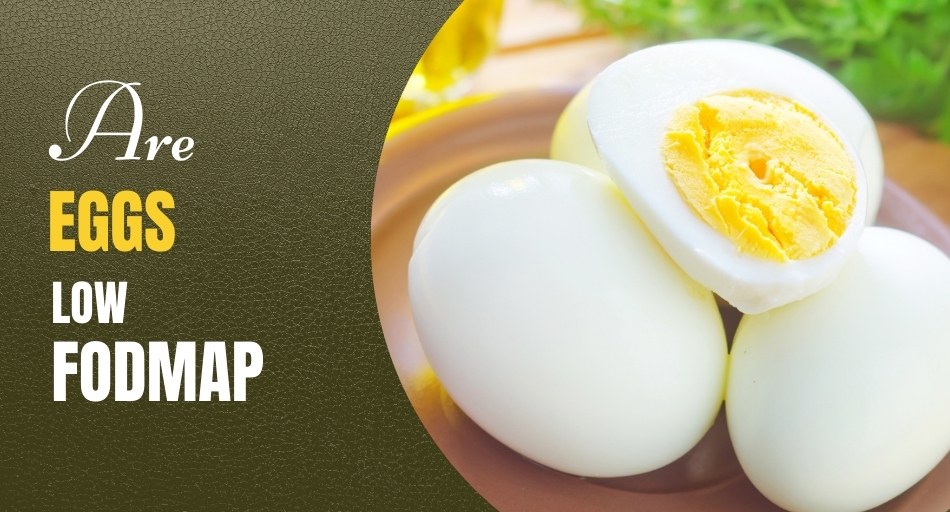Following a diet low in FODMAPs has been known to be beneficial for people with irritable bowel syndrome (IBS) and other digestive system issues.

This is because such a diet limits fermentable carbs that are hard for your stomach to digest.
Sometimes it might be hard to figure out which foods are OK for a low FODMAP diet. But there are some easy ways you can adjust your diet.
Let’s look at eggs, for example. Are they high in FODMAPs? Or are they suitable for an IBS-friendly diet?
Table of Contents
Are eggs low FODMAP?
Eggs are on the list of foods allowed on a low-FODMAP diet. They contain barely any carbs, so they’re very unlikely to cause indigestion. What’s more, they contain a lot of protein and other nutrients that, which makes them helpful for people with IBS.
In addition, eggs are rich in nutrients like riboflavin, vitamin B12 selenium, and phosphorus.
All of these micronutrients are important for good health and disease prevention, making eggs an excellent addition to any diet.

How low in FODMAPs are eggs?
One large egg contains only about 0.6 g of carbs, which is very little. Because of that, they’re also low in fermentable, hard-to-digest carbs.
So, they make for a great food to include on a low FODMAP diet.
Eggs are also rich in protein, which is a good macronutrient for the health of your digestive tract.
This is because it prevents overeating, thus reducing the risk of indigestion, which is bad for people with IBS.
Are eggs good for you?
Eggs contain virtually no carbohydrates. In fact, most of the calories found in eggs come from fat and protein.
A single hard-boiled egg provides you with 5.3 g of fat (8% of your daily need) and 6.3 g of protein (13% of your daily need).
This makes eggs a very nutrient-dense food that is very filling and satiating. Because of that, eating eggs can be beneficial for weight loss and weight management.
Eggs are also a great source of riboflavin, containing 15% of your daily recommended need for this micronutrient in one egg.

Riboflavin helps your body break down carbs, fats, and proteins in order to produce energy. It also allows for oxygen to be used by your body.
What’s more, riboflavin, also known as vitamin B2, contributes to the development and function of your skin, digestive tract lining, blood cells, and other organs.
So, make sure to load up on a lot of riboflavin-rich foods.
Eating eggs also helps you reach your daily need for selenium. This mineral may protect you against heart disease, boost your immune system, and even prevent mental decline.
It also works as an antioxidant, which means that it flushes out free radicals from your body. This prevents oxidative damage to your cells and lowers your risk of heart disease, diabetes, and cancer.
In addition, eggs are particularly rich in other unique antioxidants – lutein and zeaxanthin.
These two antioxidants are found especially in your retina, protecting your eyes from damage caused by sunlight.
They also reduce the risk of eye diseases, such as macular degeneration and cataracts.
Lutein and zeaxanthin are primarily found in the yolk. So eating this part can help you get the most out of this health benefit.
One large egg is also a great source of choline, which is a very important nutrient for your brain.
Also, choline and choline supplements may help prevent fatty liver disease and birth defects during pregnancy.

So, including foods rich in choline like eggs as well as organ meats, caviar, fish, and mushrooms.
It’s also worth noting that the old saying that eggs raise the levels of ‘bad’ cholesterol isn’t true.
In fact, studies show that dietary cholesterol ingested from food doesn’t affect your body’s cholesterol levels.
What’s more, eggs can even raise ‘good’ cholesterol levels, preventing heart disease and stroke in healthy people.
Many studies have confirmed these findings, so you can safely eat eggs without worrying about their effect on your heart.
Can you eat eggs on a low FODMAP diet?
Eggs are easy to digest and contain very few FODMAPs. Because of that, they’re safe for people with IBS. You can eat them in all their forms – even omelets and frittatas.
The last two can be a great choice when you’re eating out, as long as they don’t contain onions or garlic.
Hard-boiled eggs can be a great snack choice on a low FODMAP diet as well. So, stocking up on this nutrient-rich and delicious food is a wonderful choice for those with IBS and other digestive system issues.
How should you prepare eggs for a low FODMAP diet?

Whether you eat scrambled eggs, hard- or soft-boiled eggs, poached eggs, or fried eggs, you’re still getting around the same amount of FODMAPs.
So, you can freely alternate between different ways of preparing this food.
One thing to keep in mind, though, is that frying your eggs increases the caloric content as well as how much fat you’re consuming.
Eating too much fat makes your stomach work harder are digesting the food, so you’re at a higher risk of indigestion.
This can be particularly bad for people with IBS. So, it might be best to primarily consume poached and hard- or soft-boiled eggs, as they’re cooked without any added fat.
Also, when you do decide to make scrambled eggs, avoid adding onion and garlic. This is because these two ingredients are high in FODMAPs. So, eating them can cause digestive system issues in some people.
Conclusion
Eggs contain very little FODMAPs, so they are a perfect food to add to a low FODMAP diet.
Because of that, they can be consumed by people with IBS and other digestive system issues without causing any unpleasant symptoms.
What’s more, eggs are an excellent source of several nutrients like protein, riboflavin, vitamin B12, phosphorus, and selenium.
All of these are important for great health and well-being as well as disease prevention.
So, eating eggs can be really good for you.
Sources: Nutrition Data, Cleveland Clinic, National Library of Medicine, and Wiley Online Library
